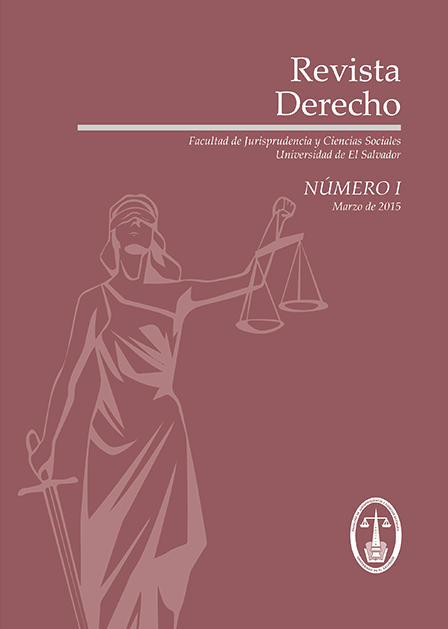Historical Approach to the Constitutional Regulation of Political Rights and their Evolution in Political Participation in El Salvador
Keywords:
citizenship, political rights, representative democracy, elections, constitutional system, electoral system, active suffrage, passive suffrageAbstract
This article presents the historical briefly, legal and political process that has occurred in the Salvadoran State regarding the requirements and circumstances that motivated the Constitutions of the Republic enforceability of certain conditions in order to establish whether a resident holds the as a citizen, and if, therefore, is enabled by the Legal System to exert Political Rights, the most representative of them the right to active suffrage, but it gradually extends to passive suffrage. Progressive changes that the constituent embodied in the Magna Carta, so that we can appreciate several steps ranging from the recognition of census vote, according to the nineteenth-century European legislation which had changed its form of government from Absolute Monarchy to Republics, until the latest reforms enacted by the Legislature Assembly, and interpretations by the Constitutional Chamber of the Supreme Court of Justice, which allowed include the scope of political participation for choose President and Vice President of the Salvadoran citizens living abroad, as well as approval of transitional Electoral Code reforms that allowed to vote in the recent elections to the agents of the National Civil Police and students of the National Academy of Public Safety, which historically were unable to vote in every election. It is therefore the synthesis of a process of greater inclusion in the Salvadoran Electoral System.
Downloads
References
AA.VV. Historia de El Salvador, Tomo II. Ministerio de Educación. Primera Edición. San Salvador, El Salvador. 1994, Pág. 22-23
ARISTOTELES. Politeia (La Política). Publicación del Instituto Caro y Cuervo. Primera edición, prologada, vertida directamente del griego y notas por Manuel Briseño Jáuregui. Estudio preliminar e introducciones por Ignacio Restrepo Abondano. Bogotá, Colombia. 1989. Pág. 44.
AVENDAÑO ROJAS, X. Elecciones, ciudadanía y representación política en el Reino de Guatemala, 1810-1821. Boletín AFEHC N°12, publicado el 04 septiembre de 2005.
BOBBIO, N. Teoría General de la Política. Editorial Trotta. Primera edición en español, traducida por Antonio del Cabo y Gerardo Pisarello. España. 2003, Pág. 402 y 403.
CAÑAS DINARTE, C.; CORTEZ, V. S. “Historia del Órgano Legislativo de la República de El Salvador 1824-2006”.
CARDENAL, R. El poder eclesiástico en El Salvador.1871-1931. Dirección de Publicaciones e impresos Biblioteca de Historia Salvadoreña. Segunda edición. San Salvador, El Salvador. 2001, Págs. 135- 138
CASTRO, J. R. “Notas sobre actores, ideas e ideologías en las luchas por la emancipación de El Salvador”, Revista Ciencia Política de la Facultad de Jurisprudencia y Ciencias Sociales de la Universidad de El Salvador, junio de 2010. Año 2. No. 3 a diciembre 2012 Año 4 No. 14
COMISIÓN INTERINSTITUCIONAL PARA LA IMPLEMENTACIÓN DEL VOTO DESDE EL EXTERIOR. Estudio técnico de factibilidad para la implementación del voto desde el exterior de las salvadoreñas y los salvadoreños residentes en el exterior para las elecciones presidenciales 2014. San Salvador, El Salvador, 2012
DALTON, R., El Salvador, monografía. UCA editores. Tercera edición. San Salvador, El Salvador. 1993
DUVERGER, M. “Instituciones Políticas y Derecho Constitucional” Editorial Ariel, sexta edición. España. 1980.
HÁNDAL, Shafick. Teoría de la situación revolucionaria Ediciones Instituto Schafik Hándal. Primera Edición. San Salvador, El Salvador. 2012.
HERNÁNDEZ TURCIOS, Héctor Antonio. Régimen de partidos políticos 1930 1975. Tesis doctoral. Universidad de El Salvador. San Salvador, El Salvador. 1977.
HUGO, V. Los Miserables. Editorial Porrúa. Nota preliminar de Javier Peñalosa. México. 2011.
INICIATIVA SOCIAL PARA LA DEMOCRACIA (ISD) Línea base del sistema electoral salvadoreño. Primera edición. San Salvador El Salvador, noviembre de 2011.
MARTINEZ URIBE, A. A veinte años de los Acuerdos de Paz. Un análisis acerca de la reforma fundamental: la institución armada. Colección de estudios CENICSH. Primera Edición. San Salvador, El Salvador. 2012
MONTERREY, F. Historia de El Salvador. Anotaciones cronológicas. 1810-1842 Tomo I. Editorial Universitaria. Primera edición. San Salvador, El Salvador. 1997.
OLMEDO LOPE, H. J. “Breves Consideraciones al régimen de titulación de inmuebles en la legislación salvadoreña” Tesis doctoral. Universidad de El Salvador. Facultad de Jurisprudencia y Ciencias Sociales. San Salvador, El Salvador. 1969.
PICARDO JOAO, O. Historia y Reforma de la Educación Superior en El Salvador. Organización de las Naciones Unidas para la Educación, la Ciencia y la Cultura, y Ministerio de Educación de la República de El Salvador.
QUEIPO DE LLANO, J. M. Historia del levantamiento, guerra y revolución de España, Tomo I. Imprenta de Casimir. París, Francia.1838.
RODRÍGUEZ RUÍZ, N. Historia de las instituciones jurídicas salvadoreñas. Sección de publicaciones de la Corte Suprema de Justicia. Primera edición. San Salvador, El Salvador, 2006.
TOCQUEVILLE, A. de, El antiguo régimen y la revolución, Fondo de Cultura económica. Tercera edición. México 2006.
VARGAS VALENCIA, A. Las Instituciones de Justiniano en Nueva España. Instituto de Investigaciones Filológicas, en Cuadernos del Instituto de Investigaciones Filológicas número 25. Universidad Nacional Autónoma de México. México. 2011.
VIDAL, M. Nociones de historia de Centro América. Departamento Editorial, Ministerio de Cultura. Quinta edición. San Salvador, El Salvador. 1957.
Downloads
Published
Issue
Section
License
Copyright (c) 2022 Revista Derecho

This work is licensed under a Creative Commons Attribution-NonCommercial 4.0 International License.
The authors transfer the copyright rights in favor of the Faculty of Jurisprudence and Social Sciences of the University of El Salvador (through Aequus Editorial) to include their writing in Revista Derecho.








